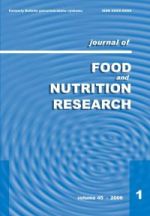Scientific journal
Journal of Food and Nutrition Research
Summary No. 1 / 2018
Udechukwu, M. C. – Abbey, L. – Nwodo, U. – Udenigwe, C. C.
Potential of Moringa oleifera seeds and leaves as functional foods ingredients for human health promotion
Journal of Food and Nutrition Research, 57, 2018, No. 1, s. 1-14
Chibuike Chinedu Udenigwe, School of Nutrition Sciences, Faculty of Health Sciences, University of Ottawa, 451 Smyth Road, Ottawa K1H 8L1, Canada. E-mail: cudenigw@uottawa.ca
Received 20 September 2017; 1st revised 23 November 2017; accepted
Summary: Moringa (Moringa oleifera Lam.) is a tropical and subtropical shrub used for horticultural, food and folk medicinal purposes. It has a prospect of use in meeting human nutritional needs and in health promotion. The interest in the application of Moringa oleifera as a functional food or source of nutraceuticals is an indication of the versatility of the plant and its various medicinal properties and use in the temperate and semi-temperate regions. Moringa seeds and leaves are the most utilized parts, containing bioactive compounds that can regulate osmotic adjustment, enzymatic and hormonal activities and various metabolic pathways. Studies showed that they possess the capacity to intervene in human diseases including diabetes, obesity, inflammation, cancer, hypertension and microbial infections. Their biological effects, especially in chronic diseases, are discussed in this review, focusing on the active phytochemicals and mechanisms of action. Further research is needed to identify the physiological targets, specific molecular mechanisms and bioaccessibility/bioavailability of the active components in moringa seeds and leaves. Most importantly, thorough human trials are strongly needed to validate efficacy and risk of toxicity, in order to facilitate their development and incorporation into foods as health-promoting agents.
Keywords: Moringa oleifera; functional food; natural health product; phytochemical; biological activity
Download:
(pdf, 340.41 Kb, 3170x)










